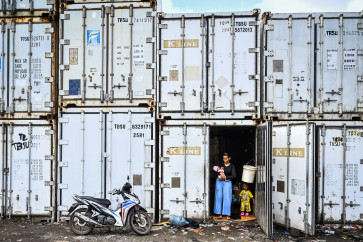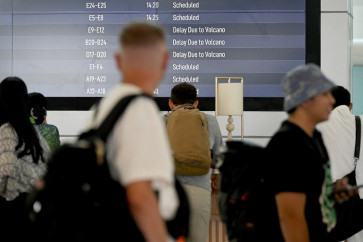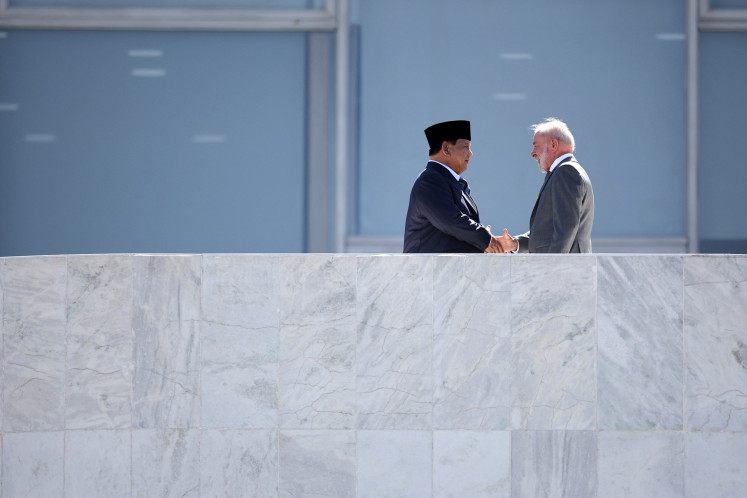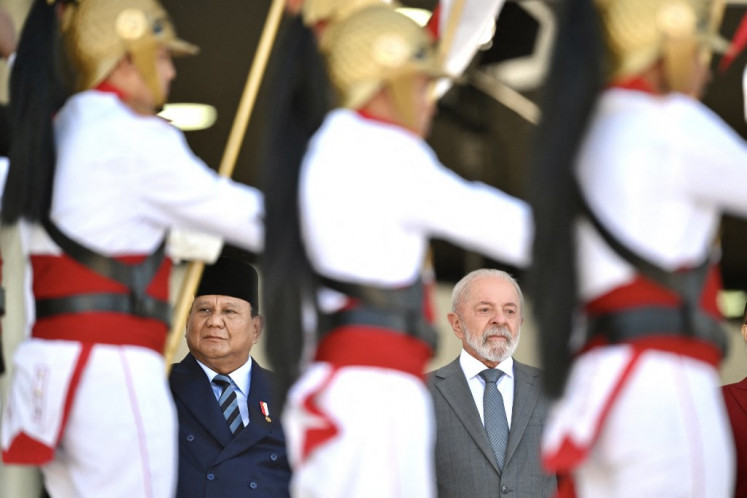Popular Reads
Top Results
Can't find what you're looking for?
View all search resultsPopular Reads
Top Results
Can't find what you're looking for?
View all search resultsCommemorating the Battle of Surabaya and modern heroes too
Sixty-six years ago, British forces landed in Surabaya as part of the Allies acceptance of Japan’s surrender and to recover prisoners of war
Change text size
Gift Premium Articles
to Anyone
S
ixty-six years ago, British forces landed in Surabaya as part of the Allies acceptance of Japan’s surrender and to recover prisoners of war. However, included within this British force was a Dutch military contingent with a covert mission to regain colonial rule over Indonesia. The Battle of Surabaya followed and is one of the most important in Indonesian history.
The renowned Bung Tomo led the battle and gave a fiery, emotional radio address that propelled thousands of Indonesians, both civilians and soldiers, to action.
Charged with the spirit of freedom, 30,000 Indonesian soldiers and more than 100,000 civilian volunteers marched into battle. They were humble, ordinary Indonesians who faced an overwhelming challenge, but rose gallantly against the impending tyranny.
While Indonesia suffered heavy losses in that battle, it showcased the courage of its people and proved to be the first steps along a young nation’s journey to freedom. Each year, their courage is celebrated on Nov. 10 with National Heroes Day.
The British underestimated what they faced. Even though they bombed Surabaya from the air and sea, a fierce battle raged for 21 days, as the previously victorious Allied forces were pinned down by the overwhelming power of our ragtag armies. Two famous British generals, Brig. Gen. AWS Mallaby and Brig. Gen. Robert Guy Loder Symond, were killed in action.
During the battle, more than 20,000 Indonesians died and Surabaya was totally destroyed. From a military point of view, it was a heavy loss. But it showed the determination and courage of Indonesian fighters, which earned the respect of both the Allied forces and the entire nation of Indonesia, too. More than 300 British-Indian troops were inspired by Indonesia’s struggle for independence and switched sides to fight alongside us. Many more Allied forces showed solidarity with our revolutionaries by refusing to join the battle.
In that battle, the British re-learned the lesson of the spirit of freedom, the very theme prime minister Churchill trumpeted in the wake of the Battle of Britain as Germany lay siege to London. Britain decided to leave Indonesia permanently in November 1946.
Later, Britain shifted its tone by openly supporting Indonesia by voting for its independence at the United Nations. The whole world held Indonesia in esteem as they learned that the newly formed republic was popularly supported by the people instead of being the dream of a few elites.
The day encourages Indonesians to reflect on the great virtues of our heroes. The soldiers who gave their lives for a greater good, and their leader, Bung Tomo, who only recently was awarded the title of national hero for his role in the Battle of Surabaya.
But we have modern-day heroes, too. The same fortitude, resolve, and bravery that our Indonesian ancestors showed in this battle are not lost. Today, many possess this courage in their own right.
With rampant poverty in rural areas, people face hardships and the likelihood of a bleak future. Despite a trend in domestic servant abuse, millions of Indonesians, mostly women, travel to foreign countries as domestic workers in the hope of giving their families a better life. They go despite the risks and potential dangers.
I met one of these women on a plane to Hong Kong. To my surprise, she and others like her accounted for almost half of the passengers on the flight.
Sitting next to me, the middle-aged woman struggled to hide her nervousness. It was her first flight, her first working assignment in a foreign country, and so I did my best to strike up a relaxing conversation. She earnestly shared her story of a struggling family and two young sons who sometimes went hungry.
Working as a domestic servant abroad was a way to earn decent pay and break that terrible cycle. But clearly, the possibility of abuse and having to leave her loved ones behind was troubling her. But she felt like it was her only hope and the right thing to do. The job gave her hope that her boys would be healthy and strong, get a better education and her family could break out of poverty. She wanted to save her family, and so was boldly setting forth.
I was stunned. She possessed a noble dream, the strength of iron and burning courage. In a way, she was just like the heroes of the Battle of Surabaya who embodied these same values. That migrant worker lady on the plane was determined to realize her dream and was thinking, “No matter how dire the challenges in her life may be, she must persevere, march on and face them at all costs.”
She is proof that the spirit of the Battle of Surabaya lives on in the ordinary Indonesian. The spirit of National Heroes Day can be found in the people standing around you, just as in our past generations. It transcends the ages and can help build a better future for Indonesia.
The writer is a native Indonesian and an economist focused on energy and the environment at the Nicholas Institute for Environmental Policy Solutions, Duke University in Durham, North Carolina, US.










